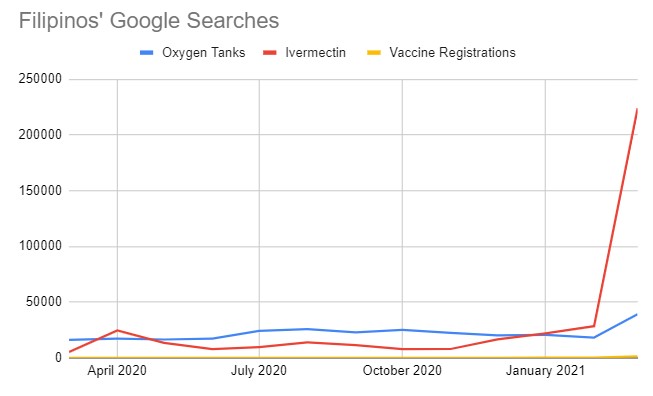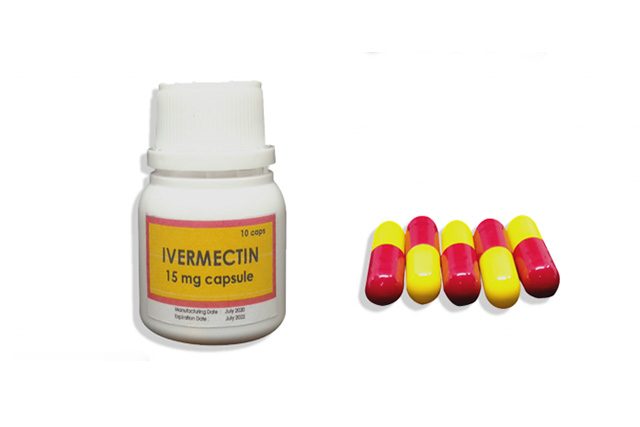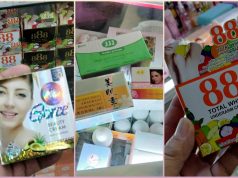The interest in the controversial anti-parasitic drug ivermectin increased in March this year.
Google searches about the use of ivermectin surged by an alarming rate last month, according to the data analyzed by a meta-search website.
In its latest data, product discovery and comparison platform iPrice Group stated that searches in Google for the drug reached 224,110 in volume, which was 687% compared to the previous month.
The meta-search site said people may have been starting to talk about ivermectin even as early as February, so if the Google
searches of March 2021 are compared with November 2020, when there wasn’t much talk about it, the surge is much
higher at 2,705%.
Ivermectin is registered and approved in the Philippines for treating parasites in some animal species only.
However, due to the worsening coronavirus pandemic and hospitals running out of bed capacities for COVID-19 patients, some Filipinos looked into the possibility of using the veterinary product for COVID-19 treatment.
READ: Can ivermectin lessen risk of COVID-19? Health orgs debunk claims
Based on Google Trends’ data, the platform predicted that search interests for ivermectin will continue to grow by April.
Meanwhile, in line with the shortage of hospital care, the online interest for “oxygen tanks” also skyrocketed since the pandemic started with 39,160 in search volume from March 2020 to March 2021.
“During this second wave, hospitals are experiencing a shortage of space and oxygen tanks. Thus, Filipinos are looking for oxygen tanks in case of worst-case scenarios,” iPrice said.
Google Trends also predicted that searches for oxygen tanks will continue to take about a 376% surge in April as compared to March.
This data, however, differs from the search volume for the keywords “vaccine registrations” wherein iPrice recorded only an estimated 1,430 in keyword searches.
This translates to about 157 times lower than the searches for ivermectin.
“The number of Google search volume of vaccine registrations from January to March (2,070) only accounts for 0.0047% of the country’s Google population,” iPrice said.

These findings supported the results of a Pulse Asia survey in late March where only 16% of respondents are willing to have themselves inoculated with a COVID-19 vaccine.
The rest of the 61% declined to be vaccinated and protected against the virus.
Despite the continuous rise in infections, vaccine confidence remained low among Filipinos.
Data on Google searches were gathered from Google Keyword Planner’s search volumes from March 2020 to March 2021.
Keywords “vaccine registration,” “vaccine registrations,” “ivermectin,” “oxygen tanks,” and “oxygen tank” were recorded.
Data on the same keywords were observed for April.
Aside from ivermectin, another medicine called Lianhua Qingwen was found being sold by online sellers and possibly used for COVID-19 treatment.
Screenshots of these shops were shared by Registered Pharmacist Doctor of Pharmacy and TikTok content creator Arshie Larga on Twitter.
“Nagkalat online ang mga nagbebenta ng Lianhua capsules. Please ‘wag po kayong bumili ng gamot na ito sa mga online sellers! Hindi po sila authorized na magbenta ng gamot! Ang Lian Hua ay isang prescription medicine,” Larga said.
“Kumonsulta muna sa doctor bago gumamit ng gamot na ito,” he added.
Nagkalat online ang mga nagbebenta ng Lianhua capsules.
Please ‘wag po kayong bumili ng gamot na ito sa mga online sellers! Hindi po sila authorized na magbenta ng gamot! Ang Lianhua ay isang PRESCRIPTION MEDICINE💊
💡Kumonsulta muna sa doctor bago gumamit ng gamot na ito. https://t.co/G4OzsoiVym pic.twitter.com/avJCtFSL3N— Arshie Larga (@Arshiethromycin) April 8, 2021
Larga also shared an informative TikTok video where he explained that the capsules should not be sold in the market.
The Department of Health and the Food and Drug Administration also previously clarified that the Lianhua capsule is only approved as a traditional herbal product.
It helps remove “heat-toxin invasion of the lungs, including symptoms such as fever, aversion to cold, muscle soreness, stuffy and runny nose.”










